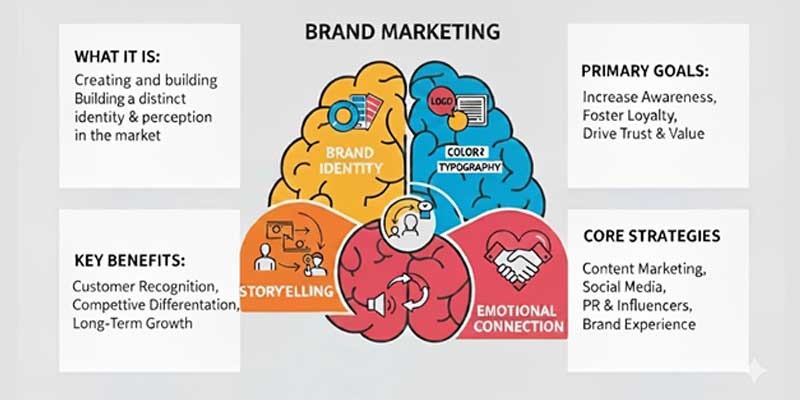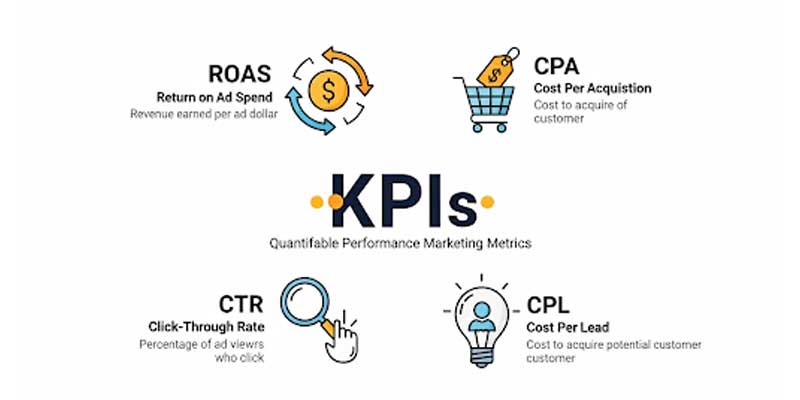

The dispute between performance marketing and brand marketing matters more now than ever before in business promotion. What should you invest more in brand introduction or trackable sales results? Combining performance and brand marketing strategies helps brands succeed through the whole customer journey.
Whether you're launching a product or scaling fast, the brand vs performance marketing conversation is key to creating sustainable business momentum. This article by advertising agency in Bangalore describes the basic difference between performance and brand marketing approaches and presents methods to connect them for better outcomes.
Through brand marketing, organizations establish strong lasting brand reputation. Your approach defines how you share your narrative while building emotional ties to generate more brand followers.

Brand marketing is the strategic process of building and nurturing a company’s identity, values, and emotional connection with its audience. Unlike performance marketing, which focuses on immediate results, brand marketing emphasizes long-term equity, creating a reputation that drives loyalty and preference over time. It is about fostering emotional resonance so that customers connect with the brand beyond the product or service offered. Effective brand management ensures that this connection translates into trust-building, which ultimately reduces customer acquisition costs and enhances retention. Brands like Coca-Cola, Apple, and Nike have proven that strong brand equity can fuel sustained growth even in highly competitive markets.
Brand marketing relies on storytelling as its foundation. The goal is to craft narratives that communicate a brand’s values, mission, and promise to its audience in a way that is memorable and meaningful. Tactics often include sponsorships, where associations with events or causes help extend brand visibility and trust. Public Relations (PR) plays a vital role by shaping brand perception through earned media and thought leadership. Over time, consistent identity and messaging across channels ensures that the brand becomes instantly recognizable, much like how Nike’s “Just Do It” or Apple’s design-driven communication has achieved cultural relevance. These storytelling channels allow brands to embed themselves in consumers’ lifestyles, shaping perception and preference over years rather than days.
A specialized branding agency in Bangalore can help businesses craft this foundation through strategy, storytelling, and design.

How to Measure Brand Marketing Success
While brand marketing is not measured by direct conversions, there are several key indicators that show its effectiveness. Brand awareness—the extent to which customers recognize or recall a brand—is a primary metric. Brand sentiment reflects how positively or negatively audiences perceive the brand across touchpoints. Brand recall indicates whether consumers remember the brand when making a purchase decision. In addition, share of voice in the marketplace can show how much visibility a brand has compared to competitors. Finally, engagement metrics such as likes, comments, and content shares reveal how effectively the brand’s storytelling resonates with its audience. Collectively, these metrics provide insights into how strong a brand’s identity is, and whether marketing efforts are creating long-term equity.
Performance marketing focuses on online promotion that earns income only when clear performance targets are met such as website clicks and buying activities. You pay only for results achieved through your performance strategies.
Performance marketing refers to a data-driven approach where every marketing action is directly tied to measurable results. Unlike traditional brand campaigns, its success is evaluated through clear metrics such as Cost Per Acquisition (CPA), Return on Ad Spend (ROAS), Click-Through Rate (CTR), Cost Per Click (CPC), and Cost Per Lead (CPL). This makes it a highly accountable model, where businesses can track exactly how their investments are performing in real time. The goal is simple—spend money only when the desired action, such as a lead, sale, or signup, is achieved. By focusing on these KPIs, marketers can quickly determine what’s working and optimize campaigns for maximum efficiency.
Performance marketing operates across several digital channels, each offering precision targeting and measurable results. Search Engine Marketing (SEM) and Pay-Per-Click (PPC) ads ensure brands appear at the right moment when users are searching with intent. Social media advertising on platforms like Facebook, Instagram, LinkedIn, and TikTok allows campaigns to be personalized for specific demographics and interests. Affiliate marketing drives conversions through partnerships where affiliates earn commissions only on successful actions. Meanwhile, Connected TV (CTV) advertising has emerged as a powerful tool, combining the reach of television with the targeting accuracy of digital platforms. These channels collectively enable businesses to reach potential customers across the funnel with measurable outcomes at every stage.
In unpredictable economic environments, businesses often demand greater efficiency from their marketing spend. This is where performance marketing becomes a critical driver of growth. Since every dollar is linked to a measurable outcome, brands gain immediate accountability on whether their campaigns are delivering results. It reduces the risk of wasted budgets, as campaigns can be paused, scaled, or optimized in real time based on performance. Furthermore, by focusing on budget efficiency, companies can allocate resources toward the most profitable channels, ensuring that marketing investments directly contribute to revenue. In times of uncertainty, this agility and precision make performance marketing not just a choice, but a necessity. Understanding performance marketing vs brand marketing means knowing that performance campaigns aim for quick wins—while brand campaigns lay the groundwork.
The most fundamental difference between performance marketing and brand marketing lies in their objectives. Performance marketing is designed to drive immediate conversions, whether it’s a sale, a lead, or a sign-up. The goal is short-term growth, often tied to direct ROI. Brand marketing, on the other hand, focuses on long-term equity by building awareness, trust, and loyalty over time. While performance delivers quick wins, brand marketing ensures a company remains relevant and preferred for years. The two approaches serve different ends of the growth spectrum but are most effective when integrated.
The success of performance marketing is measured with quantifiable KPIs such as:

Brand marketing requires a different set of measurement tools since its outcomes are less immediate but equally crucial:
This distinction highlights the challenge—performance data is tangible and real-time, while brand data is cumulative and often requires longitudinal tracking.
Performance campaigns are typically short bursts, optimized for immediate action. For example, a PPC campaign may run for days or weeks, with instant insights into conversions. Brand campaigns, however, are long-term investments, often running for months or even years. Their effectiveness builds gradually, as consistent messaging creates recognition, emotional attachment, and loyalty. Businesses need to set clear expectations: performance marketing delivers instant results, while brand marketing shapes the foundation for future demand.
Marketers often face trade-offs when deciding budget allocations between performance and brand marketing:
Over-investing in performance can lead to dependency on paid channels, with rising CAC. Conversely, neglecting performance for brand-only initiatives can slow immediate growth. The optimal approach is finding a balance, where performance delivers conversions today and brand marketing sustains tomorrow’s pipeline.
| Feature | Brand Marketing | Performance Marketing |
|---|---|---|
| Primary Goal | Awareness, trust, emotional value | Conversions, leads, and revenue |
| Timeline | Long-term impact | Short-term results |
| Metrics | Sentiment, reach, NPS | ROAS, CPC, CTR, CPL |
| Platforms | PR, social storytelling, visual branding | Google Ads, Meta Ads, email campaigns |
| Measurability | Low (but critical for loyalty) | High (driven by data and attribution) |
In performance marketing vs brand marketing, this approach is best when you need results fast—but it must be backed by long-term brand support. Collaborating with a performance marketing agency in Bangalore can ensure optimized ad targeting, better cost-efficiency, and stronger ROI tracking.
Businesses that excel at marketing choose and combine both strategies to reach all their audience touchpoints.
Most contemporary performance marketing firms enable you to create brand content that generates interest and sales simultaneously.
In performance marketing vs brand marketing, this approach is best when you need results fast—but it must be backed by long-term brand support. Collaborating with a performance marketing agency in Bangalore can ensure optimized ad targeting, better cost-efficiency, and stronger ROI tracking.
One of the clearest lessons in the performance vs brand marketing debate comes from observing how modern startups transition as they scale. In the early stages, brands like Airbnb, Slack, and Notion relied heavily on performance-driven campaigns to capture early adopters and achieve rapid traction. Paid search, referral programs, and targeted ads were the fastest routes to measurable growth, helping them prove product-market fit.
However, as growth began to plateau, these companies recognized the limits of performance-only strategies. Customer acquisition costs (CAC) started to rise, and incremental returns on ad spend began to shrink. At this stage, they pivoted toward brand storytelling to create differentiation, trust, and cultural relevance.
Airbnb moved beyond performance ads to invest in storytelling campaigns that emphasized “belonging anywhere,” shifting the brand from just a booking platform to a lifestyle and cultural movement.
Slack started by focusing on conversion-driven tactics but soon leaned into brand messaging that highlighted how it was “where work happens,” creating an emotional and aspirational identity for teams.
Notion, after gaining traction through communities and referrals, amplified its growth by showcasing creativity, productivity, and empowerment through storytelling-driven campaigns, positioning itself as more than just a tool.
The takeaway is clear: performance marketing drives early growth, but brand marketing sustains long-term equity. When startups hit the growth ceiling of paid channels, shifting toward brand-building efforts helps reduce reliance on constant ad spend, lowers CAC, and builds lasting preference in the market.
Marketers should not isolate metrics but design a framework that measures both conversion efficiency and brand health. For example, CPA and ROAS can track short-term efficiency, while brand awareness, recall, and sentiment measure long-term strength. By integrating these KPIs, leadership teams gain a fuller picture of marketing’s impact across the funnel.
Industry studies recommend that businesses allocate around 40–60% of their budget toward brand marketing, with the remainder invested in performance. This balance allows campaigns to fuel immediate growth while also creating sustained demand. Over-investing in one side leads to diminishing returns, while a blended approach maximizes ROI.
Performance and brand campaigns should not exist in silos. Messaging consistency across the funnel is critical—brand campaigns establish trust and identity, while performance campaigns drive action. A prospect who first sees a brand campaign should later encounter performance ads that reinforce the same story, ensuring continuity and reducing friction in the customer journey.
Creative storytelling is not limited to brand marketing. Performance ads that incorporate strong creative—imagery, narrative, or emotional hooks—perform better and build recall. Likewise, brand campaigns can integrate clear CTAs or product value propositions to encourage action. This interplay ensures that both approaches reinforce each other instead of working independently.
Practitioners often highlight that brand and performance are not opposites but partners in growth. On a popular Reddit marketing thread, two standout insights capture this balance:
These perspectives emphasize that while performance drives measurable actions, brand ensures there’s an audience to act on them.
The debate between performance marketing and brand marketing is less about choosing one over the other and more about finding the right balance. Performance delivers conversions today, while brand ensures those conversions continue tomorrow.
In the end, brands that harmonize performance and brand marketing don’t just win short-term revenue—they build enduring equity that keeps them relevant for decades.